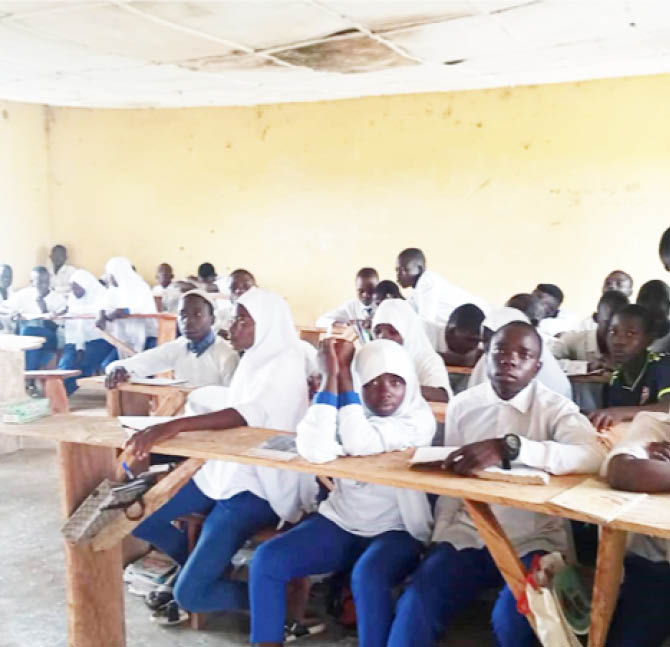Hundreds of children have been forced out of different schools in banditry-ravaged communities in Rafi, Shiroro, Munya, Mariga, among other local government areas in Niger State. A figure from the Universal Basic Education Commission in 2018 showed that 550,906 primary pupils and junior secondary school students were out of school in the state. This trend, according to an investigation by Daily Trust Saturday, has worsened as both the parents and children have nearly lost hope of returning home any time soon
At the peak of the attacks between 2020 and 2021, which targeted schools, the state government ordered the complete closure of primary and secondary institutions in Shiroro, Munya, Rafi and other banditry-infested local government areas.
- 2023: PDP asks Tinubu to withdraw from presidential race over ‘fake bishops’
- INEC drops Abacha’s son, names Wali PDP guber candidate in Kano
Daily Trust Saturday also found that teachers in the affected communities had sought to transfer to safer schools.
Consequently, having stayed long in displaced persons camps, communities in Rafi, Mariga and Shiroro said they mulled the idea of finding alternatives to ensure that their children continued their education. As a result, they registered the children in public primary and secondary schools close to the camps. Findings also revealed that community associations made efforts to engage indigenes with requisite qualifications to teach the children.
Abdulmalik Ibrahim, chairman of the Madaka Community Development Forum, one of the communities heavily ravaged by banditry in Rafi Local Government Area, said parents and the youth could no longer watch their children scavenge in displaced persons camps as they did not know when insecurity would subside for them to return home.

Daily Trust Saturday observed that in Madaka, Rafi Local Government Area, over 50 villages with huge populations have been sacked in the last three years and indigenes now live as displaced persons in Maikunkele and adjoining villages in Bosso Local Government Area. Other places heavily hit by incessant attacks in Rafi are Kusherki and Majanjan.
Daily Trust Saturday also discovered that the number of orphans in the affected local government areas has increased over the years. This trend, according to women who spoke with our correspondent, has heightened the pressure on women whose husbands were killed, as they now stand as breadwinners.
Ibrahim said, “We have so many orphans in the camp, and their education has become a serious concern to us.
“The Madaka Community Development Forum was formed on the eve of these banditry attacks. We came together to find solutions to some of our problems. We realised that while we were in the camps, our children began to keep bad companies because they were not engaged in meaningful things. Some of them started scavenging. As a result of that, we came together and formed the “Youth Education Forum,” where we started following some philanthropists and politicians we knew were generous enough to assist us.
“We raised some money, and so far, we have been able to register 105 children, mostly orphans. We bought their uniforms and learning materials. Some of them were registered in public primary and secondary schools around the Maikunkele community, where we currently live as displaced persons. Some of them are in Tudun-Fulani and Baban-Dabo primary schools, all in Bosso Local Government.
“Some of our brothers who were in higher institutions have nearly lost hope because their parents who live as displaced persons can no longer afford to pay their tuition fees. We are battling to feed, so you cannot talk of paying school fees.
“We felt we could not continue that way because if we allow these children to live a life of their choice, what we are trying to run away from would continue to hunt us.”
He appealed to the state government to assist in getting more orphans and other displaced persons registered by rendering financial support to buy learning materials and pay their school fees.
“It is a serious problem. We even wrote to the education authority of our local government and some prominent politicians, but many of them have not come to our aid,” he said.
Hafsat Abubakar, a widow whose husband was kidnapped and killed because they could not pay the ransom they demanded said, “They killed my husband and five of my children, one of who was also married and had four kids. So, I am left with the remaining seven children of mine and my grandchildren now. Considering the condition we are in now, you cannot talk about the education of these children because we don’t have money. I am now into bean cake and masa frying business to provide for the children that are under me.”
In Shiroro Local Government, Jibrin Abdullahi Allawa, president of the Lakpma Youth Assembly, also one of the districts heavily hit by attacks, said similar alternatives had been deployed to ensure that the children did not continue to stay out of school.
“The truth of the matter is that majority of the children in our communities are still out of school. But some parents who could afford to register their children in cities like Minna have taken them to those places. Our community association is also making a lot of efforts to encourage them. Recently, we held a symposium for them to rekindle their hope.
“In Allawa community, we have reopened the government secondary school. Initially, the school served as a military base, but when terrorists attacked the base, the entire school was set ablaze. It was a boarding school; the hostel was not affected. The hostel is close to the new military base. We spoke with the soldiers that we wanted the children to resume school. As I speak with you, the children in Allawa community and adjoining villages have gone back to school. We made contributions within the community and constructed furniture for them to use. We are using the hostel as classrooms for students in secondary school.
“Primary schools have also resumed, but they run shift because since Allawa is now considered to be safe because of security presence, pupils from other primary schools in the area are now being taught here. All the neighboring villages have converged in Allawa because that is where we have security,” he said.
He added that the community had engaged the indigenes with requisite qualifications to teach and get monthly stipends.
He said, “All the teachers in the neighbouring communities were mobilised to come down to Allawa to attend to the pupils at the headquarters. All of them now teach at the Central Primary School, Allawa. All the primary schools in the neighbouring villages have been shut down, but the Central Primary School is open.
“We use Government Secondary School, Allawa for students. The major challenge with regard to the secondary aspect is that most of the teachers from outside the local government sought transfer; only two permanent teachers are still in the school. They are the ones teaching the students from JSS1 to SS3 classes. What we did was to engage those that were indigenes with requisite qualifications to volunteer to teach, and we are paying them stipends.”
In Mariga, where several schools were affected, one of the displaced persons, Abubakar Agaji, told our correspondent that they registered their children in public schools in other towns instead of continuing to keep them at home.
“Some children were registered in private schools while some were taken to public schools in towns and other villages that have not been affected by insecurity. But all the schools in our villages, such as Mahundu, Woraga, and several others, have been shut.”
The chief imam of Madaka, Ibrahim Shehu, lamented that for several years to come, they would not recover from the negative impact of attacks on their communities. He called for government’s support to minimise the pains of the losses.
He said, “Kidnapping and killings were many. Our women were raped. We lost our means of livelihood. Our cattle were rustled, including mine.
“Our children have been out of school for the past three years and those in the positions of authority are not showing concern. Some of them were in the university but we could not pay their tuition fees anymore because we lost our means of livelihood. Those in primary and secondary schools were all forced out. Our schools have been destroyed. We are now beggars. Government should help us.
“Apart from those that were killed, about 300 others who were kidnapped are still with them. We don’t know their conditions or whereabouts. We have over 1,000 orphans. Many women are now widows. Some of the men that were killed left their wives with 9 children and even more. Many women have died of hypertension because they didn’t know how they would take care of the children.
“As I speak with you, we don’t know if those in captivity are still alive.”
The director of the Society for Alleviation of Rural Poverty and Integrity of Peaceful Coexistence, John Bawa, said there was the need for well-meaning individuals and the government to come to the aid of displaced persons, especially in terms of food and education of their children.

 Join Daily Trust WhatsApp Community For Quick Access To News and Happenings Around You.
Join Daily Trust WhatsApp Community For Quick Access To News and Happenings Around You.


